Can i Use Vinegar to Clean Guitar [Properly]
For guitar enthusiasts and musicians, maintaining the impeccable condition of their beloved instruments is paramount. Among the unconventional yet increasingly popular methods of guitar maintenance, one intriguing contender is vinegar.

This guide delves into the realm of using vinegar as a cleaning agent for guitars. From its properties and advantages to the potential risks, we will explore whether vinegar is a suitable choice for your guitar care routine. So, before you embark on this unique approach, let’s uncover the details of using vinegar to clean your guitar.
# Table of Contents =>
- 0.1 The Properties of Vinegar –
- 0.2 Benefits of Using Vinegar for Guitar Cleaning –
- 0.3 Risks and Considerations –
- 1 Guide to Cleaning Your Guitar with Vinegar:
The Properties of Vinegar –
Vinegar, a versatile household item, contains acetic acid, which is known for its effective cleaning properties. Its acidic nature allows it to dissolve dirt, grime & even light mineral deposits. That is making it a potentially useful tool for guitar maintenance. However, caution is advised, as excessive use or improper application of vinegar can lead to unintended consequences.
Benefits of Using Vinegar for Guitar Cleaning –
a) Gentle Cleaning:
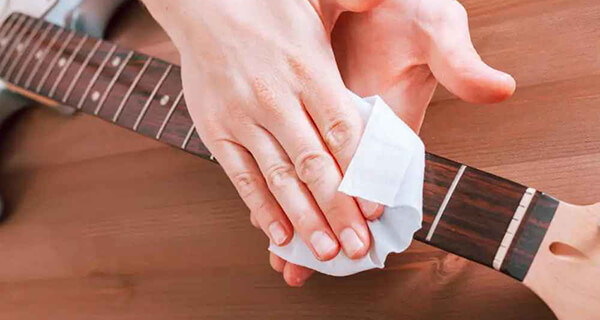
Vinegar, when diluted properly, can offer a gentle cleaning solution for various parts of your guitar, including the body, fretboard, and hardware. It can effectively remove built-up dirt without causing damage to the finish or delicate components.
b) Non-Toxic and Eco-Friendly:
Unlike many commercial cleaning agents that contain harsh chemicals. But vinegar is a natural & eco-friendly option. This makes it an attractive choice for those who prefer environmentally conscious cleaning methods.
c) Cost-Effective:
Vinegar is readily available in most households, making it a cost-effective alternative to specialized guitar cleaning products.
d) Removal of Oxidation:
The acetic acid in vinegar can help remove light oxidation from metal hardware, such as tuning knobs and bridge components, restoring their shine and functionality.
e) Fretboard Conditioning:
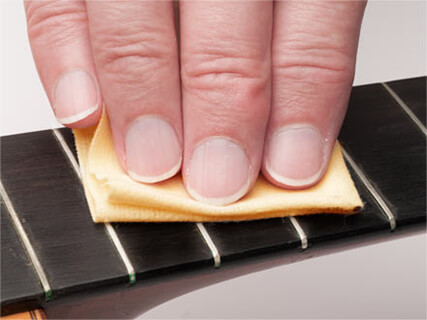
Vinegar can also aid in conditioning certain types of fretboards, like those made from rosewood. However, proper dilution and post-cleaning moisturizing are crucial to prevent over-drying.
Risks and Considerations –
a) Acidic Nature:
While vinegar’s acidity can be beneficial for cleaning, it can also damage certain finishes, particularly nitrocellulose lacquer. Always perform a spot test in an inconspicuous area before using vinegar on your guitar.
b) Dilution:

Vinegar must be diluted properly with water before application. A common ratio is one part vinegar to three parts water. Failing to dilute it adequately can lead to finish damage and discoloration.
c) Avoid Contact with Electronics:
Vinegar should never come into contact with the guitar’s electronic components, as it can cause corrosion and malfunction.
d) Moisture Management:
After cleaning with vinegar, it’s essential to wipe down the guitar thoroughly and ensure that no moisture is left on the surface or in crevices.
e) Fretboard Hydration:
If using vinegar to clean a fretboard, follow up with a reputable fretboard conditioner or mineral oil to prevent excessive drying.
Guide to Cleaning Your Guitar with Vinegar:
Here’s a detailed guide to cleaning your guitar with vinegar:
1. Gather Supplies:
Before you start, gather all the necessary supplies:
- White distilled vinegar (avoid using balsamic or other flavored vinegars)
- Soft, lint-free microfiber cloths
- Small bowl or container
- Water
- Guitar polish (optional)
- Guitar fretboard conditioner or lemon oil (for fretboard hydration, optional)
2. Spot Test:
Before applying vinegar to your guitar, conduct a spot test on an inconspicuous area, such as the back of the headstock. This helps ensure that the vinegar won’t adversely affect the finish or the wood of your guitar.
3. Dampen Cloth:
Dilute the vinegar with an equal amount of water in a small bowl. Dip a corner of a microfiber cloth into the vinegar solution. Wring out excess liquid, ensuring the cloth is damp but not dripping.
4. Gentle Wiping:

Gently wipe down the guitar’s body, neck, and headstock with the damp cloth. Work in small sections and use light pressure. Avoid getting excess liquid near the guitar’s electronics, including pickups and controls. Vinegar can be abrasive, so be gentle to prevent any potential damage to the finish.
5. Fretboard Cleaning:
For the fretboard, you can use the damp cloth to clean off any dirt or residue. Be careful not to let excess liquid seep into the fret slots. If the fretboard is particularly dirty or dry, you can use a separate microfiber cloth dampened with a small amount of lemon oil or fretboard conditioner.
6. Hardware Cleaning:
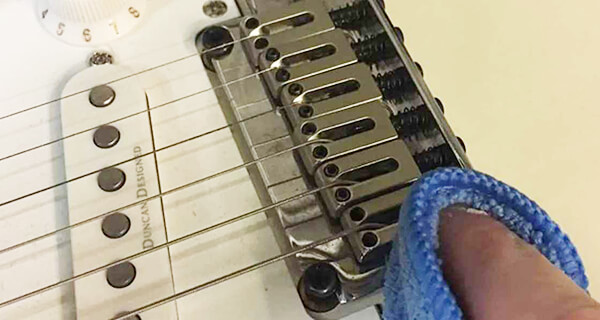
To clean the hardware (tuners, bridge, knobs, etc.), lightly dampen a cloth with the diluted vinegar solution and wipe down the metal parts. Be cautious not to get vinegar on any painted or finished surfaces, as it can cause damage.
7. Thorough Drying:
After wiping down all the surfaces with the damp cloth, go over the guitar again with a dry microfiber cloth to remove any remaining moisture. Ensure that no moisture is left on the guitar’s surface or in any crevices.
8. Fretboard Hydration (Optional):
If you have a wooden fretboard, you can optionally hydrate it after cleaning. Apply a small amount of fretboard conditioner or lemon oil to a clean cloth and gently rub it into the fretboard. Wipe away any excess conditioner with another clean, dry cloth.
Remember:
- Avoid using undiluted vinegar, as it can be too harsh for your guitar’s finish and wood.
- Don’t use vinegar on guitars with nitrocellulose finishes, as it can damage them.
- Always be gentle and cautious to prevent any potential damage.
Can i clean my guitar with water?
Cleaning your guitar is an essential part of maintaining its appearance & performance. However, when it comes to using water as a cleaning agent, caution is advised. Guitars are intricate instruments made from delicate materials, and water can potentially cause irreversible damage.
This article examines the risks associated with cleaning guitars using water and offers safer alternatives to maintain your instrument’s longevity.
a) Dust & Debris:
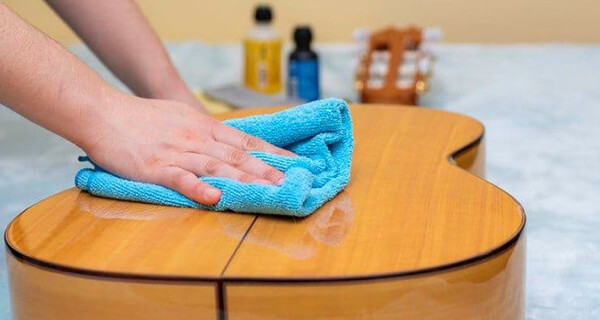
To clean the guitar surface, wipe it gently with a soft, dry cloth. Microfiber cloths are recommended for this purpose.
b) Fingerprints and Smudges:
The guitar’s finish may have fingerprints or smudges. You can use a slightly damp cloth, but make sure it’s not dripping wet. Gently wipe the affected areas & then dry them immediately with a dry cloth.
c) Strings:
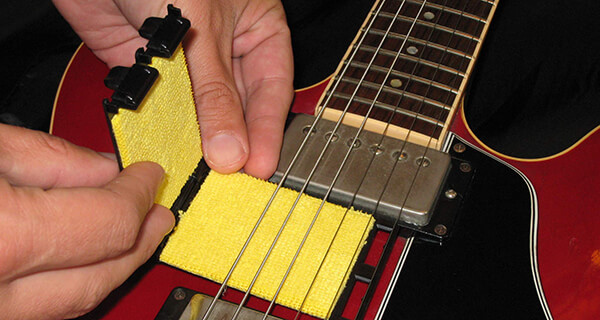
You can use a dry cloth or a specialized string cleaner to wipe down the strings after playing to remove sweat and oils that can accumulate on them.
d) Fretboard:
If the fretboard is dirty, you can use a specialized fretboard cleaner or conditioner that is safe for the type of wood on your guitar. Avoid using products that contain lemon oil, as it can potentially damage some types of fretboard woods.
e) Hardware:
For metal hardware like tuners and bridge components, you can use a damp cloth to wipe them down. Just make sure to dry them thoroughly afterward to prevent corrosion.
Incorporating specialized guitar cleaning products and methods is essential for preserving your instrument’s integrity. While water might seem convenient, its potential to harm the guitar’s materials outweighs any benefits. Prioritizing proper cleaning techniques will ensure your guitar looks great and retains its exceptional sound.
Pros of Cleaning a Guitar with Water:
Readily Available: Water is easily accessible and cost-effective, making it a convenient cleaning option.
Gentle Cleaning: Water is generally gentle and won’t cause immediate damage when used in moderation.
Removes Light Residues: Water can effectively remove light dust and fingerprints from the guitar’s surface.
Safe for Certain Parts: Water can be used on metal hardware and some types of finishes without causing harm.
Environmentally Friendly: Using water as a primary cleaning agent aligns with Eco-friendly practices.
Cons of Cleaning a Guitar with Water:
Risk of Damage: Water can penetrate wood, causing warping, cracking, and finish damage if excess moisture is present.
Potential Corrosion: Water can lead to rust or corrosion on metal parts if not dried thoroughly.
Limited Effectiveness: Water might not effectively remove stubborn grime, oils, or built-up residues.
Fretboard Concerns: Excessive water exposure can dry out and damage certain fretboard woods.
Lack of Protection: Unlike specialized guitar cleaners, water doesn’t provide protection or nourishment for the wood or finish.
While water can be used to clean a guitar in certain situations, it’s crucial to exercise caution and moderation. For more thorough and safe cleaning, relying on dedicated guitar cleaning products is recommended.
In the End, using vinegar to clean your guitar can be a cost-effective and environmentally friendly option, provided you approach it with caution and proper knowledge. While vinegar’s acidic properties can effectively remove dirt and grime, the potential risks to certain finishes and components should not be underestimated.
FAQs –
Q: What should I avoid when using vinegar to clean my guitar?
A: Avoid getting vinegar on the frets, inlays, or any electronic components like pickups and controls. Also, don’t let the vinegar mixture sit on the guitar’s surface for too long; wipe it off promptly.
Q: Can I use vinegar to clean the fretboard?
A: Using vinegar on the fretboard is generally not recommended, as it could potentially dry out the wood. Instead, use specific fretboard oils or conditioners recommended for your guitar’s wood type.
Q: How often should I clean my guitar with vinegar?
A: You shouldn’t need to clean your guitar with vinegar too frequently. Regular wiping with a soft, slightly damp cloth is often sufficient for routine maintenance.
Q: Can I use vinegar to remove stubborn grime or dirt?
A: Vinegar can help with some light cleaning, but for stubborn dirt or grime, it’s best to consult a professional guitar technician. They have the experience to clean your guitar safely.
Q: Should I remove the strings before cleaning with vinegar?
A: It’s generally a good idea to remove the strings before cleaning any part of your guitar. This makes it easier to access all areas without the risk of accidentally getting vinegar on the strings.
Last Updated on September 14, 2023 by Perry Garner


